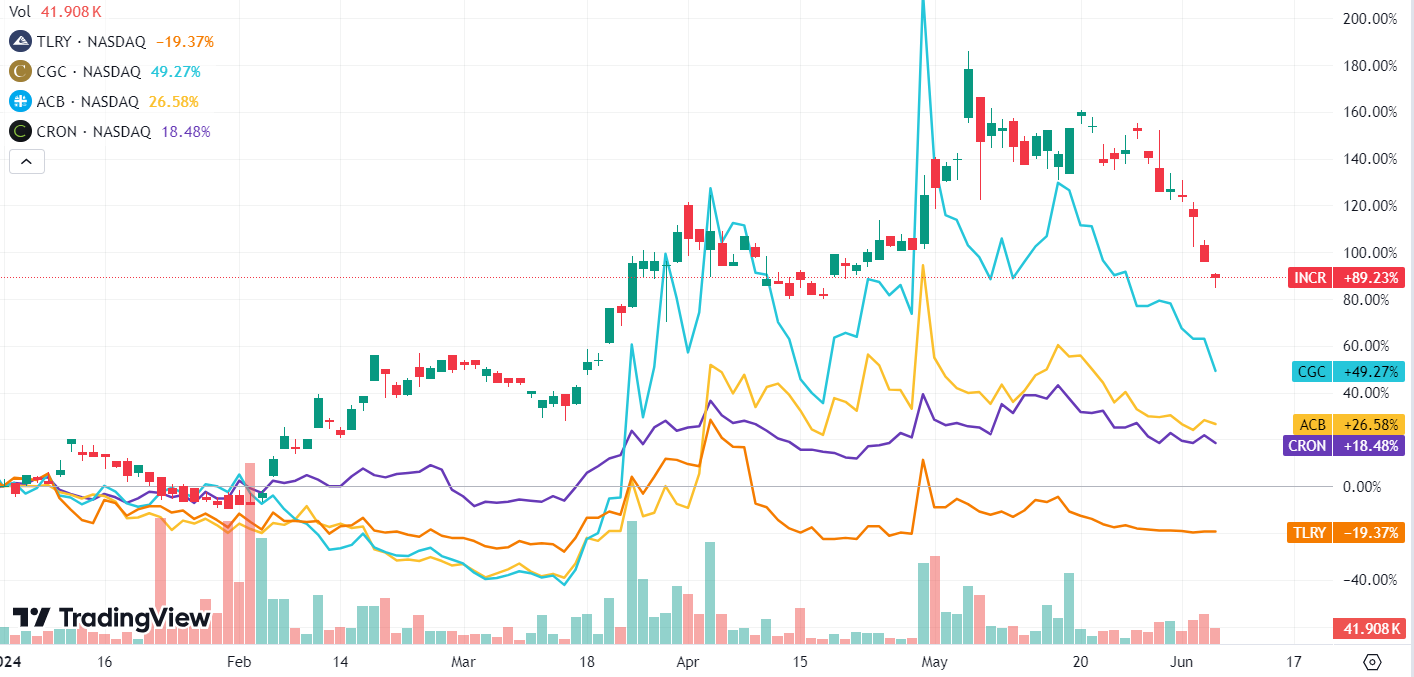Global Markets News report looks into the recent developments in the global medical cannabis sector and the meteoric rise of InterCure.
TORONTO, ON / ACCESSWIRE / June 8, 2024 / Remember the cannabis craze up global markets back in 2018? It swept across North America and around the world, somewhat resembling today’s AI investment boom, with many companies listed on global stock exchanges, and multiple Canadian companies raising billions of dollars (most of which they later burned through).
In recent years, the cannabis market trend faded, and valuations began aligning more closely with business performance. But since the start of 2024, there’s been a significant shift. The global cannabis market has received some big boosts, primarily from a major reform in the German medical cannabis market, which removed cannabis from the list of narcotic substances. This change makes medical cannabis more accessible and could lead to full insurance coverage, similar to other medications. Additionally, In the U.S., major developments are occurring, such as the potential rescheduling of medical cannabis, with strong support from the Biden-Harris administration, FDA recommendations, and more, all pushing for a change in its classification as a dangerous drug. Just last week, in fact it was reported that 97% of public comments in the U.S. supported this change.
Cannabis Market Rally
Thanks to these developments, the cannabis stock market has been rallying since the beginning of the year, with stock prices of leading companies on the NASDAQ soaring and trading volumes increasing significantly. Almost all leading cannabis stocks on the NASDAQ have jumped by tens of percent, except for Tilray, which, despite showing revenue growth in its latest quarterly reports, continues to post substantial losses and has depleted its cash reserves.

Source: TradingView
Why is InterCure Leading the Pack?
InterCure (a dual-listed company on the NASDAQ and Tel Aviv Stock Exchange) seems to have seen the most significant rise among leading cannabis stocks on the NASDAQ, outpacing almost all other companies even when taking into account a recent pullback. While it’s hard to pinpoint the exact reason, some coverage has argued that it could be due to the growing belief that InterCure is well-positioned to take full advantage of global cannabis market reforms. For example, Pablo Zuanic, a top cannabis market analyst, recently published a report highlighting InterCure as a promising company amid these changes, estimating a potential stock price increase of up to five times the current value.
Leading in Medical Cannabis Sales Outside North America
According to that report and recent filings, InterCure seems to be leading in medical cannabis sales outside North America. The medical cannabis sector requires specialized expertise, stringent regulations, and typically involves working with pharmacies, often offering products with high CBD content. InterCure’s expertise in medical and pharmaceutical-grade cannabis is well recognized in the cannabis market. The opening of cannabis markets and easier licensing for patients in Germany, and potentially other European countries, alongside developments in the U.S., may allow InterCure to leverage its knowledge and competitive advantages gained in the Israeli market, which has advanced medical cannabis regulations.
InterCure operates a vertical model in Israel, controlling cultivation, drying, distribution, and sales through 29 company-owned pharmacies. This model maximizes profitability on company-grown products and provides crucial operational flexibility in the medical cannabis market. This approach has driven the company’s annual revenues close to 400 million shekels, reflecting a significant market share in the Israeli cannabis market, and is a good example of how the company could potentially operate in new markets as well. In fact, InterCure already announced its plans to launch new products in Germany, following the recent reform.
Financial Strength
Another unique aspect of InterCure is its financial strength compared to other Israeli and international companies in the field. By the end of 2023, the company had 101 million shekels in cash reserves and an adjusted EBITDA of 53 million shekels for the year. In contrast, Canadian players attempting to penetrate their market face substantial losses, high debts, and inefficient management.
Given the significant losses recorded by Canadian cannabis companies, some may be forced to cut expenses, potentially hindering their efforts to enter the European market and reducing their cash burn rates. This could create a vacuum in European markets due to the exit or reduced activity of existing competitors-a vacuum that financially strong companies like InterCure could potentially fill.
One thing is certain-the entire market is watching the U.S. rescheduling process and potential additional changes in Europe, and as we get closer, the cannabis market is likely to remain volatile.
Global Markets News Network is a digital news network brand offering commentary and exploration into the current and future states of emerging technologies and markets such as: cyber, pharma, food, cannabis and more. The industry update is not intended to serve as financial, medical, investment or legal advice and may include partner content. Please refer to our full disclaimers and disclosures regarding the report https://justpaste.it/czrsi/pdf.
Cannabis News Desk
Global Markets News
[email protected]
SOURCE: Global Markets News


Be the first to comment